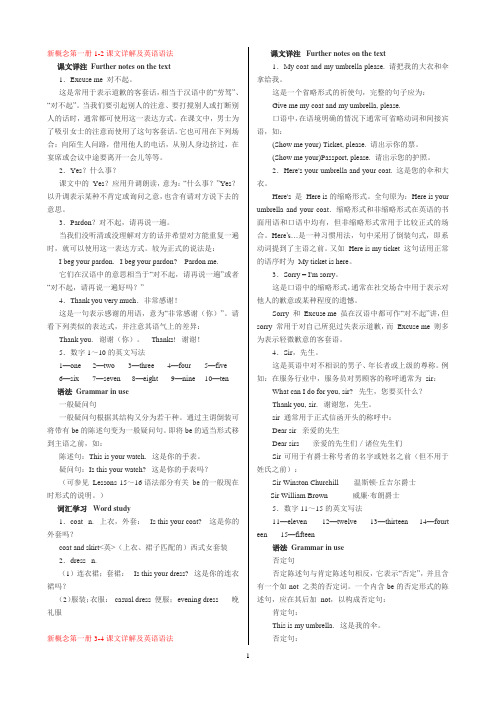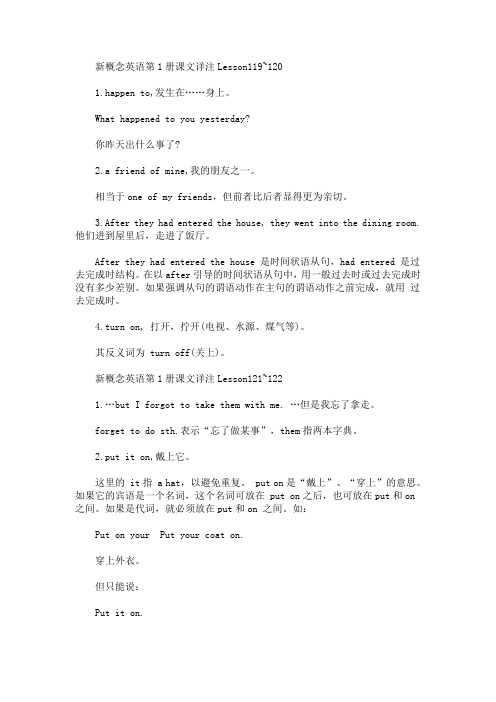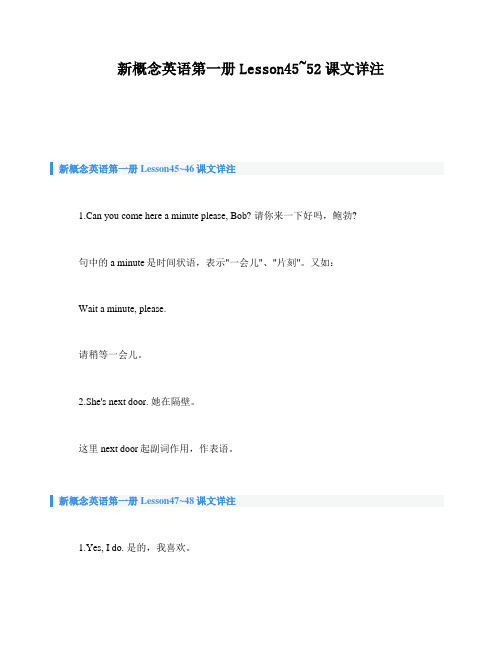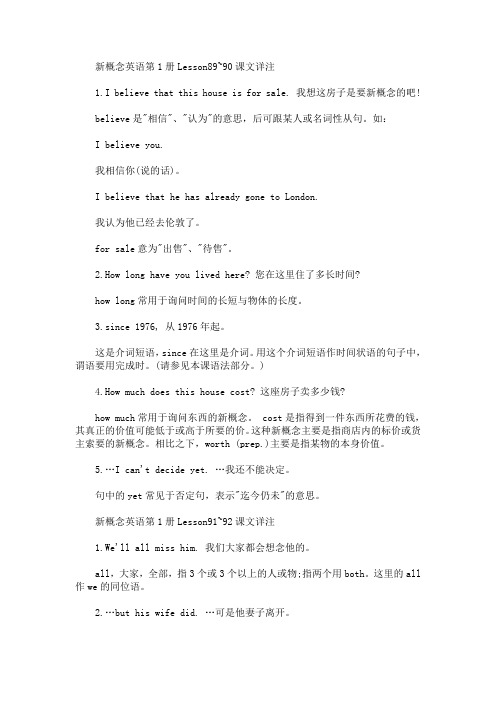新概念英语第一册课文详注分享
新概念英语第1册课文详注Lesson33_38

新概念英语第1册课文详注Lesson33~38【导语】新概念英语一共144课。
整本书无论是语法还是词汇,题材还是语句,都有其出彩之处。
正是因为如此,新概念英语更是经久不衰,深受广大英语学习者的喜爱。
小编为您整理了“新概念英语第1册课文详注Lesson33~38”,希望可以帮助到您!新概念英语第1册课文详注Lesson33~341.It is a fine day today.今天天气好。
句中的it是指天气。
又如:Is it cold today? 今天冷吗?No, it isn't. 不,不冷。
2.some clouds,几朵云。
some既可修饰可数名词,也可修饰不可数名词。
如:some tables一些椅子(可数名词),some milk一些牛奶(不可数名词)。
3.There are some clouds in the sky, but the sun is shining.天空中飘着几朵云,但阳光灿烂。
这句是并列句,由两个分句构成,连词but表明分句之间存在着对比及转折关系。
两分句之间大多要用逗号,有时可不用逗号。
4.Mr. Jones is with his family.琼斯先生同他的家人在一起。
句中with是介词,表示"和……一起"。
family是指"家里的人"或"家庭成员"。
5.They are walking over the bridge.他们正在过桥。
句中的over有"穿过"的意思。
又如:The aeroplane is flying over the river.飞机正在河上飞过。
The birds are flying over the house.鸟儿在屋上飞过。
over还可表不"在……上方"(不接触表面),如:The sky is over our heads.天空在我们头顶上。
新概念英语第一册课文详解及英语语法(全)

新概念第一册1-2课文详解及英语语法课文详注Further notes on the text1.Excuse me 对不起。
这是常用于表示道歉的客套话,相当于汉语中的“劳驾”、“对不起”。
当我们要引起别人的注意、要打搅别人或打断别人的话时,通常都可使用这一表达方式。
在课文中,男士为了吸引女士的注意而使用了这句客套话。
它也可用在下列场合:向陌生人问路,借用他人的电话,从别人身边挤过,在宴席或会议中途要离开一会儿等等。
2.Yes?什么事?课文中的Yes?应用升调朗读,意为:“什么事?”Yes?以升调表示某种不肯定或询问之意,也含有请对方说下去的意思。
3.Pardon?对不起,请再说一遍。
当我们没听清或没理解对方的话并希望对方能重复一遍时,就可以使用这一表达方式。
较为正式的说法是:I beg your pardon. I beg your pardon? Pardon me.它们在汉语中的意思相当于“对不起,请再说一遍”或者“对不起,请再说一遍好吗?”4.Thank you very much.非常感谢!这是一句表示感谢的用语,意为“非常感谢(你)”。
请看下列类似的表达式,并注意其语气上的差异: Thank you. 谢谢(你)。
Thanks! 谢谢!5.数字1~10的英文写法1—one 2—two 3—three 4—four 5—five6—six 7—seven 8—eight 9—nine 10—ten语法Grammar in use一般疑问句一般疑问句根据其结构又分为若干种。
通过主谓倒装可将带有be的陈述句变为一般疑问句。
即将be的适当形式移到主语之前,如:陈述句:This is your watch. 这是你的手表。
疑问句:Is this your watch? 这是你的手表吗?(可参见Lessons 15~16语法部分有关be的一般现在时形式的说明。
)词汇学习Word study1.coat n. 上衣,外套:Is this your coat? 这是你的外套吗?coat and skirt<英>(上衣、裙子匹配的)西式女套装2.dress n.(1)连衣裙;套裙:Is this your dress? 这是你的连衣裙吗?(2)服装;衣服:casual dress 便服;evening dress 晚礼服新概念第一册3-4课文详解及英语语法课文详注Further notes on the text1.My coat and my umbrella please. 请把我的大衣和伞拿给我。
2020最新新概念英语第1册课文详注Lesson119~126

新概念英语第1册课文详注Lesson119~1201.happen to,发生在……身上。
What happened to you yesterday?你昨天出什么事了?2.a friend of mine,我的朋友之一。
相当于one of my friends,但前者比后者显得更为亲切。
3.After they had entered the house, they went into the dining room. 他们进到屋里后,走进了饭厅。
After they had entered the house 是时间状语从句,had entered 是过去完成时结构。
在以after引导的时间状语从句中,用一般过去时或过去完成时没有多少差别。
如果强调从句的谓语动作在主句的谓语动作之前完成,就用过去完成时。
4.turn on, 打开,拧开(电视、水源、煤气等)。
其反义词为 turn off(关上)。
新概念英语第1册课文详注Lesson121~1221.…but I forgot to take them with me. …但是我忘了拿走。
forget to do sth.表示“忘了做某事”,them指两本字典。
2.put it on,戴上它。
这里的 it指 a hat,以避免重复。
put on是“戴上”、“穿上”的意思。
如果它的宾语是一个名词,这个名词可放在 put on之后,也可放在put和on 之间。
如果是代词,就必须放在put和on 之间。
如:Put on your Put your coat on.穿上外衣。
但只能说:Put it on.把它穿上。
新概念英语第1册课文详注Lesson123~1241.What a beautiful ship!多漂亮的轮船啊!what引导的感叹句通常是由 What + a(n)+形容词+名词构成的。
2.That's right.对。
这句是对上面附加疑问句的回答。
新概念英语第1册课文及详解知识分享

Lesson 1 Excuse me!对不起!Listen to the tape then answer this question. Whose handbag is it? 听录音,然后回答问题,这是谁的手袋?Excuse me!Yes?Is this your handbag?Pardon?Is this your handbag?Yes, it is.Thank you very much.New Word and expressions 生词和短语excuse v. 原谅This :pron.这me pron.我(宾格)your 你的,你们的is v. be 动词现在时第三人称单数Handbag n. (女用)手提包Pardon int. 原谅,请再说一遍It pron.它thank you 感谢你(们) very much 非常地be 的用法口诀我用am,你用are,is连着他,她,它;单数名词用is,复数名词全用are。
变疑问,往前提,句末问号莫丢弃。
变否定,更容易,be后not莫忘记。
疑问否定任你变,句首大写莫迟疑。
be动词专项练习--用am, is, are 填空:1. I ______ a student. ______ you a student? No, I _____ not.2. The girl______ Jack's sister.3. The dog _______ tall and fat.4. The man _______ a teacher.5. ______ your brother in the classroom?6. Where _____ your mother? She ______ at home.7. How _______ your father?8. Jane and Tom _________ my friends9. Where _____ my pen ?10. Where ______ my books ?11. That ______ my red skirt.12. Who ______ I?13. The jeans ______ on the desk.14. Here ______ a photo of my family .15. Here ______ some sweaters for you.句型转换的方法一.肯定句变否定句1.句子中有be,在be后加not。
新概念英语第一册Lesson45_52课文详注

新概念英语第一册Lesson45~52课文详注新概念英语第一册Lesson45~46课文详注1.Can you come here a minute please, Bob? 请你来一下好吗,鲍勃?句中的 a minute是时间状语,表示"一会儿"、"片刻"。
又如:Wait a minute, please.请稍等一会儿。
2.She's next door. 她在隔壁。
这里 next door起副词作用,作表语。
新概念英语第一册Lesson47~48课文详注1.Yes, I do. 是的,我喜欢。
是一句肯定的简略回答。
如果是否定的回答,则应为No, I don't. I like…和 I don't like…这两个句型是分别表示"我喜欢/想要……"和"我不喜欢/想要……"的惯常用法。
2.black coffee, 不加牛奶或咖啡伴侣的清咖啡。
加牛奶的咖啡叫 white coffee. black在有些搭配中不译为黑色的,如:black tea 红茶3.序数词 1st~12th1st----first 2nd----second 3rd----third4th----fourth 5th----fifth 6th----sixth7th----seventh 8th----eighth 9th----ninth10th----tenth 11th----eleventh 12th----twelfth英语中序数词必须与定冠词(the)连用。
虽然有时不在形式上表现出来,在朗读的时候也必须加上the。
如:the 1st month (第1个月),the twelfth century(12世纪)。
新概念英语第一册Lesson49~50课文详注1.What about some steak? 来点牛排吗?句中What可以换成How,用来征求对方看法或意见。
2020最新新概念英语第1册Lesson89~98课文详注

新概念英语第1册Lesson89~90课文详注1.I believe that this house is for sale. 我想这房子是要新概念的吧!believe是"相信"、"认为"的意思,后可跟某人或名词性从句。
如:I believe you.我相信你(说的话)。
I believe that he has already gone to London.我认为他已经去伦敦了。
for sale意为"出售"、"待售"。
2.How long have you lived here? 您在这里住了多长时间?how long常用于询问时间的长短与物体的长度。
3.since 1976, 从1976年起。
这是介词短语,since在这里是介词。
用这个介词短语作时间状语的句子中,谓语要用完成时。
(请参见本课语法部分。
)4.How much does this house cost? 这座房子卖多少钱?how much常用于询问东西的新概念。
cost是指得到一件东西所花费的钱,其真正的价值可能低于或高于所要的价。
这种新概念主要是指商店内的标价或货主索要的新概念。
相比之下,worth (prep.)主要是指某物的本身价值。
5.…I can't decide yet. …我还不能决定。
句中的yet常见于否定句,表示"迄今仍未"的意思。
新概念英语第1册Lesson91~92课文详注1.We'll all miss him. 我们大家都会想念他的。
all,大家,全部,指3个或3个以上的人或物;指两个用both。
这里的all 作we的同位语。
2.…but his wife did.…可是他妻子离开。
句中did代替上文中的 wanted to leave。
新概念英语第1册Lesson93~94课文详注1.next-door, 隔壁的。
新概念英语第一册课文详注

新概念英语第一册课文详注想要学好英语的你,怎能错过新概念英语?今天小编给大家带来新概念英语第一册课文详注,希望能够帮助到大家,下面小编就和大家分享,来欣赏一下吧。
新概念英语第一册课文详注Lesson7~12新概念英语第一册课文详注Lesson7~81.My name's = My name is。
这是自我介绍时通常使用的句型:My name is…(后面加上自己的姓名)。
有时也可用I'm…这一句型。
2.Are you French,too?你也是法国人吗?在英语中,too和either两个词都表示"也"的意思,然而too仅用于肯定句中,either则限于用在否定句中。
too和either一般都放在句末,且前面通常用逗号隔开。
例如:Is Sophie Italian, too?索菲娅也是意大利人吗?Is Robert a keyboard operator, too?罗伯特也是电脑录入员吗?3.What nationality are you?你是哪国人?此问句用来询问对方的国籍。
也可以问 Where are you from?或 Where do you come from?4.What's your job?你是做什么工作的?What's =What is。
询问对方从事何种职业时还可以说:What do you do?5.I'm an engineer.我是工程师。
I'm=I am。
口语中经常使用这种缩略形式。
英语不定冠词有两个:a,an。
在发音以元音音素开头的词前面用an,在发音以辅音音素开头的词前面用a。
engineer的发音是以元音音素开头的,所以前面要用an。
(可参见第5-6课_Nice to meet you中的有关说明。
)6.数字16~20的英文写法16-sixteen 17-seventeen 18-eighteen19-nineteen 20-twenty新概念英语第一册课文详注Lesson9~101.How are you today?你今天好吗?这是朋友或相识的人之间见面时问对方身体情况的寒暄话,一般回答语为:Fine, thank you.很好,谢谢。
新概念英语第一册笔记(全)[1]
![新概念英语第一册笔记(全)[1]](https://img.taocdn.com/s3/m/979a5df64b35eefdc9d3331a.png)
新概念第一册1-2课文详解及英语语法课文详注 Further notes on the text1.Excuse me 对不起。
这是常用于表示道歉的客套话,相当于汉语中的“劳驾”、“对不起”。
当我们要引起别人的注意、要打搅别人或打断别人的话时,通常都可使用这一表达方式。
在课文中,男士为了吸引女士的注意而使用了这句客套话。
它也可用在下列场合:向陌生人问路,借用他人的电话,从别人身边挤过,在宴席或会议中途要离开一会儿等等。
2.Yes?什么事?课文中的 Yes?应用升调朗读,意为:“什么事?”Yes?以升调表示某种不肯定或询问之意,也含有请对方说下去的意思。
3.Pardon?对不起,请再说一遍。
当我们没听清或没理解对方的话并希望对方能重复一遍时,就可以使用这一表达方式。
较为正式的说法是:I beg your pardon. I beg your pardon? Pardon me.它们在汉语中的意思相当于“对不起,请再说一遍”或者“对不起,请再说一遍好吗?”4.Thank you very much.非常感谢!这是一句表示感谢的用语,意为“非常感谢(你)”。
请看下列类似的表达式,并注意其语气上的差异:Thank you. 谢谢(你)。
Thanks! 谢谢!5.数字1~10的英文写法1—one 2—two 3—three 4—four 5—five6—six 7—seven 8—eight 9—nine 10—ten语法 Grammar in use一般疑问句一般疑问句根据其结构又分为若干种。
通过主谓倒装可将带有be的陈述句变为一般疑问句。
即将be的适当形式移到主语之前,如:陈述句:This is your watch. 这是你的手表。
疑问句:Is this your watch? 这是你的手表吗?(可参见 Lessons 15~16语法部分有关 be的一般现在时形式的说明。
)词汇学习 Word study1.coat n. 上衣,外套: Is this your coat? 这是你的外套吗?coat and skirt<英>(上衣、裙子匹配的)西式女套装2.dress n.(1)连衣裙;套裙: Is this your dress? 这是你的连衣裙吗?(2)服装;衣服: casual dress 便服; evening dress 晚礼服新概念第一册3-4课文详解及英语语法课文详注 Further notes on the text1.My coat and my umbrella please. 请把我的大衣和伞拿给我。
- 1、下载文档前请自行甄别文档内容的完整性,平台不提供额外的编辑、内容补充、找答案等附加服务。
- 2、"仅部分预览"的文档,不可在线预览部分如存在完整性等问题,可反馈申请退款(可完整预览的文档不适用该条件!)。
- 3、如文档侵犯您的权益,请联系客服反馈,我们会尽快为您处理(人工客服工作时间:9:00-18:30)。
新概念英语第一册Lesson67~72课文详注新概念英语第一册Lesson67~68课文详注1. Were you at the butcher's?刚才您在肉店里吗?at the butcher' s=at the butcher' s shop。
在英文中,表示店铺、住宅、公共机构、公共建筑物以及教堂的名字或某人家时,名词所有格后常不出现它所修饰的名词:the greengrocer' s ( shop)蔬菜水果店the hairdresser' s ( shop)理发店the stationer' s ( shop)文具店the doctor' s ( office)诊所my mother ' s ( house)我妈妈家里St . Paul ' s ( Church)圣保罗教堂2. be absent from 不在,缺席。
3. the country=the countryside 乡下。
country表示“农村”时,前面一定要加定冠词the。
新概念英语第一册Lesson69~70课文详注1.hundreds of 数以百计的。
这是用来表示不定数量的复数形式。
类似的结构还有thousands of(数以千计的),millions of(数以万计的)。
但必须注意:说five hundred(500 ) , six thousand(6000),two million(200万)等具体数字时,hundred, thousand,million这些词因为之前有具体数字而本身不加-s。
2. at the race 观看比赛。
这里的at是“出席”、“在某场合”的意思。
3. Our friends Julie and Jack were there, too.我们的朋友朱莉和杰克也去了。
Julie and Jack是Our friends的同位语。
4. car number fifteen 第15号车。
在表示编了号的东西时,可以用基数词表示顺序:Lesson 67 第67课Page 2 第2页Bus No.332 第332路公共汽车Question 10 第10个问题新概念英语第一册Lesson71~72课文详注1.What's Ron Marston like, Pauline? 波琳,朗·马斯顿是怎样一个人?What is sb. like? 这一句式可用来询问某人的外貌或品行。
就本课的具体情况而言,波琳的回答更多地是指马斯顿的品行如何。
2.He telephoned me four times yesterday…他昨天给我打了4次电话……four times, 4次。
time在英语中作不可数名词时表示"时间";作可数名词时表示"次数"。
请注意英语中次数的表示法:once 1次twice 2次three times 3次3次或3次以上通常都用基数词+ times表示:five times 5次thirty times 30次3. the day before yesterday, 前天。
4.answer the telephone, 接电话。
口语中也常用answer the phone。
类似的短语如:answer the door/doorbell应声开门answer a letter回信5.She can't speak to you now! 她现在不能同你讲话!speak to sb. 意为"与某人说话"。
例如打电话时可以说:May I speak to Pauline, please?请让波琳接电话好吗?I' d like to speak to Pauline, please.我想请波琳听电话。
6.This is Pauline's mother. 我是波琳的母亲。
This is…是英美人打电话时表示"我是……"的句式,而不说I'm…。
相关的电话用语如:This is Mary speaking.我是玛丽。
This is Edward calling from London.我是爱德华,现正在伦敦给你打电话新概念英语第一册Lesson73~78课文详注新概念英语第一册Lesson73~74课文详注1.She does not know London very well. 她对伦敦不很熟悉。
know…well这一短语意为"对……了解"。
又如:I don't know him very well.我不太了解他。
2.…and she lost her way. …因此她迷路了。
句中的and当"所以"讲,表示结果。
lose one's way, 迷路。
3.ask(sb.) the way, (向某人)问路。
4.say to oneself, 心中暗想。
注意:talk to oneself意为"自言自语地说"。
5.Can you tell me the way to King Street, please? 您能告诉我到国王街怎么走吗?tell sb. the way(to), 告诉某人(去……的)路。
6.cut himself= cut his face。
以整体代替部分是英语中的一种修辞格,叫提喻(merism )。
新概念英语第一册Lesson75~76课文详注1.Do you have any shoes like these? 像这样的鞋你们有吗?这个句子里的like these是介词短语作定语,修饰shoes,意思是"像这样的鞋子"。
2. What size? 什么尺码的?这是一个省略句,后面省略了do you want。
下文中的What colour? 同样也是省略句。
what size通常用来询问服装、鞋子、手套等的尺寸,即什么号码:What size do you wear?你穿几码的?3.They are very uncomfortable.的确很不舒适。
这个句子中的are用斜体表示强调,应重读。
这里的强调表明了售货员对女士所说的话的反感和愤怒。
新概念英语第一册Lesson77~78课文详注1.I want to see the dentist, please. 我想见牙科医生。
I want to see sb., please 这一句式是表示想见某人时常用的句式之一。
2.have an appointment(with sb.),(与某人)有约会。
I have an appointment with my dentist at 3 p.m.我已约定下午3点去看牙医。
3.Is it urgent? 急吗?这里的it 指"要见牙医"这件事。
4.Can you come at 10 a. m. on Monday, April 24th?您在4 月24日星期一上午10点钟来可以吗?Can you come at…? 这一句式通常用来约定见面时间。
注意英语中的时间次序一般是由小到大,与汉语正好相反。
又如:on July 2nd, 1988(在1988年7月2日), at seven on June 3rd, 1989 (在1989年6月3日7点)。
a.m. (=ante meridiem) 上午,有时写成A. M. 或AM;下午则是p. m. (=post meridiem),有时写成P. M. 或PM。
5.I must see…我必须见……比I want to see…语气上要更强些,表达说话人某种强烈的愿望或需求。
6.at the moment, 正在说话的这会儿,此时。
7.Can't you wait till this afternoon? 您就不能等到今天下午了吗?这是情态助动词的否定疑问句形式,表示请求。
新概念英语第一册Lesson127~134课文详注新概念英语第一册Lesson127~128课文详注1.I thought so.我也这样想。
so 是代词,意为“这样”、“如此”。
I think so的否定式为I don't think so(我不这样认为)。
类似用so的短句如:I hope so.我希望如此。
I expect so.我期待如此。
I told you so.我这么告诉过你的。
2.have another look,再(仔细)看一眼。
3. look old,看上去老。
这里look是系动词,后跟表语。
4.at least,至少。
5.I'm sure she is.我肯定她有40岁了。
其后省略了at least forty。
6.not more than twenty-nine myself,我自己还没29岁。
其中not more than是“不超过”、“不到”的意思。
这里反身代词myself 是I的同位语,用来加强语气。
She did it herself.这事是她自己做的。
新概念英语第一册Lesson129~130课文详注1.Where do you think you are?你认为你现在是在哪儿?do you think 是用在特殊疑问句中的插入语,用来征询见解或表达看法。
因为句中插入语已经是疑问式,主谓倒装了,所以you are的位置不能再对调了。
插入语一般是对句子加一些附加的解释,在句子中作独立成分。
常用来作插入语的结构有I hope, I think, I'm afraid, you know等。
插入语可以位于句尾或句中,有时也可出现在疑问句中。
2.must have been doing sth.,一定/准是在做某事。
这种结构用来表示对过去正进行的事情的推测。
下文中的can't have been是can't have been driving的省略式,在意思上与must have been driving正相反。
3.That's why I didn't see the sign.所以我才没看见那牌子。
why I didn't see the sign作is的表语从句,以why引导的从句用来解释事情的原因。
4.…you'd better take my advice! …你还是听从我的劝告吧!take one's advice是“听从劝告”的意思。
新概念英语第一册Lesson131~132课文详注1.make up our minds,打定主意。
